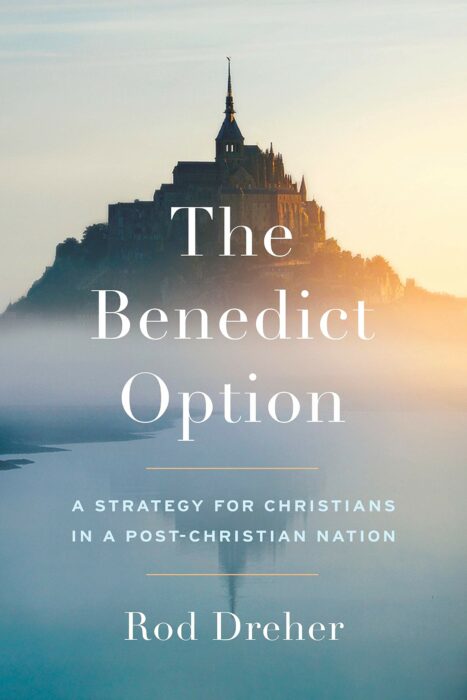Christians Can’t Consistently Blame Leftist Fiction While Pushing Our Own Propaganda
You can hear these complaints cross the Christian Interwebs:
“So-and-so author has ruined his stories by becoming too woke!”
“The LGBTQ+ Lobby is ruining stories.”
“Why can’t people just focus on good stories without politics—like they used to?”
We’ve heard complaints about secular storytelling before. Just look at the Disney boycotts back in the 1990s. Today, some particular controversies and language are different. For example, we say “cancelling” instead of “boycotting.” The underlying question is the same: should we read or watch stories with secular themes?
A new wave of Christian or Christian-adjacent pundits are answering no. They may not all demand to cancel shows, but they do prefer keeping them out of their lives.
‘Cut Disney out of [your] life’
In one May 2021 podcast episode, right-wing commentator Dinesh D’Souza urged his viewers to “cut Disney out of their life.” He went on to say, “Propaganda, especially when inflicted on kids of a very young age, corrupts the mind. … This is a destructive company that has a destructive influence in American life, and we need to treat it as such.”1
 Similarly, The American Conservative editor Rod Dreher warns that watching too much “propaganda” from the Left will change your way of viewing the world:
Similarly, The American Conservative editor Rod Dreher warns that watching too much “propaganda” from the Left will change your way of viewing the world:
But now, the Left is the cultural establishment. To watch many TV shows and movies as a social or political conservative is to be acutely aware of the propagandizing element. …
If, like me, you have a household that is not plugged in to cable TV, and that maintains significant distance from popular culture (though we watch movies and TV in our family, my wife and I heavily curate it), you see it more acutely. I’ve told the story in this space in the past about how going from watching eight to ten movies each week as a professional film critic, to watching maybe three or four a month after I changed jobs following the birth of my first child, forced an unexpected awareness of how much I had become numb to a lot of this messaging, simply by virtue of frequent exposure to it.
Even though I was at the time a cultural, religious, and political conservative, and was a lot more “woke” in that way than most, immersing myself in popular culture simply to do my job changed my way of seeing the world. 2
Readers familiar with Dreher’s nonfiction book The Benedict Option know that such reasoning has led Dreher to recommend that Christians remove themselves from today’s popular culture. Many Christians share these views that stories with unbiblical themes threaten us, if not before, then certainly now with their new religions of politics and sex.
Still, their challenges echoes those of ancient Christians, such as the third-century church father Tertullian. He objected to the idea that Christians should learn from pagans, and famously asked: “What has Athens to do with Jerusalem?”
I posit that even today, the entertainment of Athens is still relevant to Christians. Modern stories with secular themes can have real value. Avoiding the work of the “enemy” might seem biblical at first glance. But when viewed rightly, we’ll see that there are important considerations being left out of the picture.
A quick stop by the concession stand
Before moving further, let’s share three important caveats:
- This article does not explore whether Christians should read stories with profanity or erotic material. That’s a topic for another article. This is solely focused on the value of engaging works with secular themes.
- I am not a parent, so I’m not engaging the question of whether children should engage with such works. As a high school teacher, I’ve seen value in teens doing so, but this article does not address pre-teen readers.
- For space, we’ve split this article in two parts. Part 2 arrives next week.
Now, let’s talk about the problem of propaganda.
The propaganda wars
Christians often share the refrain that secular stories want to propagandize people. Why else would Disney turn LeFou gay in its Beauty and the Beast remake (2017)? Or put progressive themes regarding racism and Christianity into Zootopia (2016)?
Such criticisms often assume we’re only talking about what Christian children should enjoy. But others (such as D’Souza) apply their criticisms to every adult. And I’ve personally known several Christian adults who avoid films like these because of these worldly themes. They ask: Why consume the opponent’s propaganda?
But are Christians right to blame stories as only ammo in the propaganda wars?
 If we do, then we certainly have interesting company. Last week, Lorehaven published an article about a Christian-made historical romance novel that had been stripped of an award because the novel allegedly promoted racism.3 I haven’t read the novel (nor read enough to know more about it). Yet many secular critics called this terrible propaganda, based on the message they thought it promoted.
If we do, then we certainly have interesting company. Last week, Lorehaven published an article about a Christian-made historical romance novel that had been stripped of an award because the novel allegedly promoted racism.3 I haven’t read the novel (nor read enough to know more about it). Yet many secular critics called this terrible propaganda, based on the message they thought it promoted.
Moreover, if we blame stories as mere propaganda, then we also condemn our own propagandistic stories—including the Christian creators who want to make novels and films specifically to spread our own preachy propaganda into the world.
Is this really how we should describe stories in the first place?
Recently I challenged this in a Twitter exchange about the latest film in the God’s Not Dead franchise. I argued Christians ought not use stories as literary pep rallies. That’s unbecoming of story as an art form—like using the Mona Lisa as a drink tray. Sure, we need trays for our drinks, and it helps to have pep rallies or polemics for your side. But we already know so many better uses for works of art.
If we value stories only as propaganda or pep rallies, D’Souza’s position could make sense. Why then would we not boycott or cancel the enemy propaganda’s even while we try to make and share our own propaganda?
Christians, however, should believe that our stories can serve as so much more.
Next week: How I’ve helped public high school students seek the joys of fantastic stories.
- “DISNEY’S WOKE WORLD Dinesh D’Souza Podcast Ep 86,” May 10, 2021. ↩
- “See How You Like This, Bigot?,” Rod Dreher, The American Conservative, December 2, 2019. ↩
- “Christian Publisher Bethany House Defends ‘At Love’s Command’ From Outraged Critics,” Mike Duran at Lorehaven, Aug. 6, 2021. ↩


































I think would say it’s almost impossible to find a story that doesn’t contain propaganda.
Part of why someone might disagree with me is because we tend to define “propaganda’ as “blatant messaging” and subtle messaging some other way. But I think it’s clearer and more to the point to talk about “blatant propaganda” and “subtle propaganda.”
There is hardly any such thing as a story without a moral worldview backing it up. Something is portrayed as good and something as bad–even highly morally relativistic stories do this. Even if a story creator isn’t deliberately thinking about the message, a message comes through with the power to subtly influence others. Which, is one possible way to think of propaganda.
The unbelieving world WILL embed messages about what they value in their stories, whether deliberately or not. We Christians should know and expect this. We should not be surprised if at times the messages are very overt and very anti-God/anti-christianity. (Other times the messages will be more subtle–but still will be there.)
Our response should yes include being alert to the messaging or propaganda opposing our faith. Blatant messages we can protest if we like but I see no reason to do so. Blatant messaging is more about strengthening the base of the other side and reaching youth than subverting people with strong Christian beliefs. I’d say we need to pay more attention to subtle messaging.
And, we also need to respond by producing our own propaganda. Blatant for kids and strengthening our base and subtle to subvert the thinking of those in opposition to Christ. Yes, we can think we are just “telling a good story” but if we do so from a Christian worldview we will include some form of values that support Christian beliefs, even if subtly. Some form of messaging is inevitable.
So I disagree with the basic premise of this article. The cultural “other side” WILL produce propaganda, with only some of it blatant, and we Christian creators ought to realize we should be in the business of doing the same. Our messaging can be blatant at times, that’s ok in some contexts. Though the subtle approach should be more common.
Note my comment does not address whether I think we can learn from people in opposition to Christ. We can. We do after all share human traits and at times common values with unbelievers. But we should proceed with caution when diving into entertainment.
But of course we have our own messages, some subtle and some overt and it’s only natural to think we’d distribute them. It’s naive to think art can exist without messaging about values.
Thank you for your thoughts, Josiah, and for yours also Travis.
I’m not sure that the issue is whether the secularists or the Christians promote a message, call it propaganda if you will. A message is nearly inescapable in any story, simply based on what the author displays as the story’s values. In one sense a character arc has a value-based message. In a non-tragic tale the character will arc towards the value the author submits as “good”. In a more tragic tale that arc may curve into destructive elements, shown by the author to be “bad”. A flat arc shows values by “what” a protagonist overcomes, or “how” they overcome it.
The irony is that even if one aspires to write a story devoid of any value element, they risk preaching the “message” that values are therefore irrelevant, that their absence has no impact on the character’s journey.
My takeaway therefore is threefold:
1. Hone our critical thinking skills so that if we do consume secular stories, we can discern the message they carry, and apply godly wisdom in processing that message. Also stay tuned as to whether the Holy Spirit would have us consume that particular story. His guidance is not optional for the Christian life, but vital.
2. Caution weaker brothers or sisters who may not have developed those critical skills and could be subject to being led astray by any lies put forth. We are not ignorant of Satan’s strategies. Perhaps even write reviews that point out the lies for the uninformed. These may be children, but may also be undiscerning adults.
3. Do not be ashamed of writing from a Christian worldview. I’m NOT saying that a Christian author must include such things as an explicit gospel message in their story. But I AM saying, if one is enthralled by those elements, and derive joy from their inclusion, by all means include them. Just use excellent writing skills in how you do so. Use irony, use understatement if need be, use majestic language when appropriate. Make sure the elements are relevant to the plot and move the story forward. And by all means engage the reader with the character’s credible response. Devout Christian characters need not be taboo, nor boring. Give them depth, put them in peril, let them persevere by faith through painful loss and great suffering. In that way, others may also be enthralled, and may also derive joy because of the inclusion of such elements of our fairh.
I don’t see that as a literary pep rally. Encouraging the brethren through stories, especially when they face spiritual choices which may cost them dearly in real life, is hardly so superficial. Thanks for the opportunity to share. All the best.
Many Christians call stories with heavily secular worldviews “propaganda” because they promote falsehoods, not because the writers are trying to proselytize people. There’s nothing wrong with trying to influence someone else–unless you’re trying to influence them to accept a lie. The fact is that fiction does influence people, even if it’s sometimes only at a subconscious level. You strip out a fundamental part of storytelling if you insist that some kind of message doesn’t belong. As Travis already pointed out, it’s naive to think that anyone could write a story without a particular value, worldview, or message ending up in it. Even if that were somehow possible, who actually wants to read a meaningless story?
If I had to sum up this article, it seems to me that what you’re saying is this: Christians are being hypocritical if they in any way pushback against the lies they see being spread through secular media while at the same time they’re intentionally seasoning their own stories with truth, or are praising books/movies that do so.
Ultimately, you’re implying that Christian values, whether subtly delivered or not, are mere “propaganda” that’s no better than anything secular writers put into their work. By that reasoning, would you also call Jesus’ parables propaganda?
Not only do I think your premise is severely flawed, I’m also alarmed to see such a perspective coming from someone who runs a website for Christian writers.
This reads silly to me. Christians shouldn’t complain about tactics in the first place; just use the same tactics and propagandize back. Of course, to Christians, it wouldn’t be propaganda, but art in service of the truth. What good is it sticking to the rules of a game that the other side isn’t playing?
Great thoughts from you all! I think part of my points will become more clear when Part Two comes out next week.
This article (and its sequel) however, certainly are /not/ arguing that stories should lack messages (if that were even possible!). Every good story is going to have thematic points, and while some stories will make those points more artistically and effectively than others, they all have some. Most of what I write online is for other writers teaching them how to weave Christian themes more powerfully into their work. So I’m certainly no advocate for meaningless works.
My thesis instead has to do with how we treat works with secular themes. I’m pushing back against the idea that we should avoid works just because they have secular works–or frame them as /only/ propaganda. (Art is made to be a lot more than that.) This article focuses more on why it’s problematic to avoid a story just because it has a secular message, and the next article will focus more on how we should view works with secular themes and how we can engage with them meaningfully.
Tl;dr: This article is more about how we should read stories than how we should write them.
Here’s a potential simple test for sorting propaganda from better stories.
Propaganda asks, “What will YOU do?”
Better stories ask, “What will THIS PERSON do?”
I’m open to the theoretical possibility that secular stories can have real value for the Christian, and even in these times sometimes still realize that possibility. But, the moments are becoming further between, and in my experience, it’s because secular creators are letting their morals (or often, their producers’ morals) get in the way of a more universally appreciable story.
As these experiences mount I find myself less willing to give a new work the benefit of the doubt by taking chances and ignoring red flags. When I started on this path I experienced a good deal of FOMO. Recently that has all but entirely been replaced by schadenfreude at seeing the increasingly absurd moral gyrations fans are expected to perform versus the flatlined or declining returns in entertainment provided. I don’t feel like I’m missing out because these “secular” folks don’t even look like they’re having fun any more.
Depends on what your definition of “propaganda” is.
Heavy handed messaging is okay in certain essays, PSA’s, and sermons.
But a sermon/novel or sermon/movie hybrid is an artistic chimera that ought not be. Regardless of how right and noble the message.
Stories need themes. Not prolonged moralizing. Show. Don’t preach.
Propaganda is to literary themes as sentimentality is to catharsis.
Back in the 80’s and 90’s I would not read contemporary Christian novels. They were crammed with propaganda and sentimentality. Both require promoting cheap emotional reactions by manipulating the audience as opposed to working with the audience to achieve the effect.
Bad art is bad art even if it is Christian instead of secular.
And some secular messages are not bad. “Don’t pollute the rain forest.” But Fern Gulley is still lame. Just like the Left Behind novels/movies.
As someone has already noted here, pretty much every story contains something that someone would consider to be propaganda. We all tend to notice this kind of propaganda, we notice it when it’s saying something we disagree with, but we also notice it when the story has been subverted by the message.
Consider a story where a village is under attack, if a white Christian guy saves the village some people will complain and be offended. If someone from the LGBT community saves the village another bunch of people are offended. But the degree to which the story is embraced or rejected by people of all opinions will depend a lot of the authenticity of the story, and the way it’s presented.
Great stories of all kinds are more persuasive when there is a coherent story explanation, and complementary character development, to explain why the protagonist wins the day.
Maybe the protagonist worked with a team who have a variety of complementary skills. Maybe the audience feel like they understand who the main characters are. And maybe the outcome seems plausible, and with hindsight almost inevitable.
In summary if we ‘believe’ in the story we will more likely enjoy it and accept its message.
These are the tests by which a story stands or falls. If our stories are just “pushing propaganda” at the expense of the integrity and authenticity of the story, then our story fails, whoever we are. As Rachel Nichols says, ‘bad art is bad art even if its Christian instead of secular’.
That’s the lesson for us Christians who want to produce great fiction.